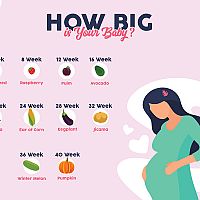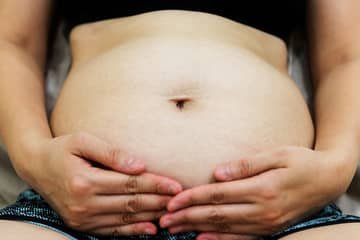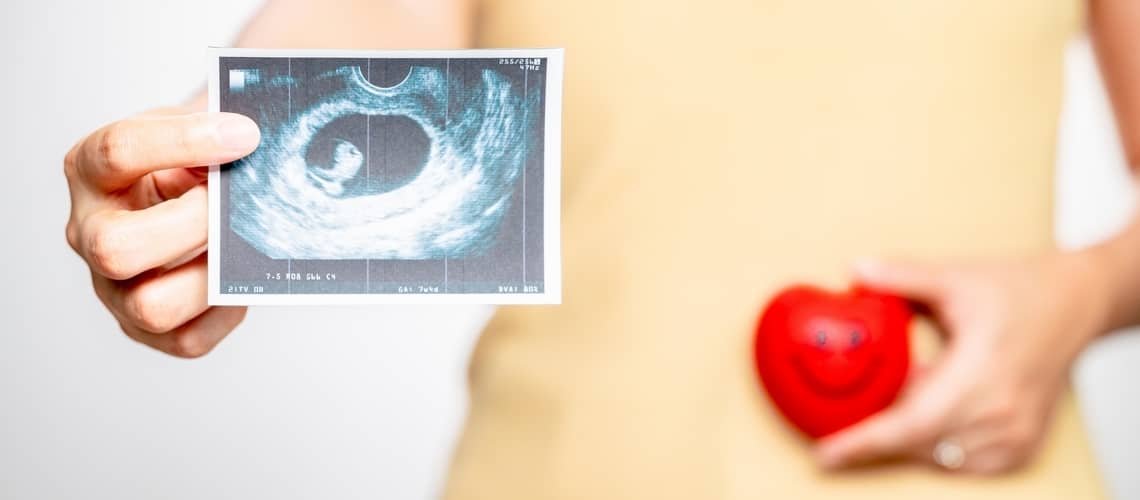
4th week of pregnancy - symptoms, ultrasound, pain in the lower abdomen, hCG
A new life is born in a woman's body and day by day the whole process progresses. Although the woman still has a long way to go, at the end of the 4th week, the fertilized egg should be definitively implanted in the uterus. The pregnancy hormone hCG is already present in the blood, and in some cases, sensitive pregnancy tests can also detect it in the urine. At the end of the 4th week, a delayed period can be a more serious symptom, and other pregnancy symptoms may or may not appear. In some women, they may also occur in the following weeks. Anyway, the fourth week of pregnancy means that the mother will be able to look forward to the desired baby for the next 8 months.
At the end of the first month, pregnancy reaches a stage when it can be concluded that a woman is pregnant and expecting a baby. However, the fact still remains that there is a large percentage of women who do not even know they are pregnant even in the 4th week. The symptoms may not appear in every case, the delay of menstruation also may not always be authoritative, especially if the woman has a less regular cycle. Implantation bleeding may appear, but everything is still not clear. Forget about ultrasound, sono or ideas about what your baby looks like. It is important to realize that from this moment on, your body, organism and psyche will begin to change significantly. However, in order not to get ahead of ourselves, let's see how the baby develops in the 4th week of pregnancy and how the entire pregnancy process continues.
4th week of pregnancy – the baby is developing
Almost two weeks have passed since the fertilization and the fertilized egg - blascotysta is finally in the uterus, where it has attached itself to her mucous membrane and implantation follows. If everything is in order, the blastocyst will remain in the uterus and the implantation will take place successfully. The egg is thus definitively implanted in the uterus, which in itself is very rare and not obvious at all. After nesting, trophoblast cells were separated from the blastocyst, which will be responsible for the development of the placenta, through which the child will subsequently be supplied with all important nutrients, oxygen and blood during its stay in the womb.
Other outer cells will also form the amniotic sac and ensure the growth of the umbilical cord. After implantation, the blastocyst turns into an embryo and the pregnancy hormone hCG (human cryogonadotropin) begins to be produced in large quantities. A grain of poppy seed, sand or a small grain of sand is used as a frequent comparison. 1 – 2 mm, exactly the dimensions of an embryo – a baby at the end of the 4th trimester.
The "fetus" is located in the amniotic sac, which is filled with liquid - amniotic fluid begins to form. The embryo contains all the cells necessary for the development of the child. Specifically, there are three types of cells in three layers. The so-called embryonic period. It lasts until the 8th week and during this time tissues, organs and systems are formed. In the outer layer (ectoderm) there are cells for the development of the nervous system, brain, eyes, cells for the growth of hair and nails and are also responsible for the color of the skin. The inner layer (endoderm) is responsible for the development of the digestive and respiratory systems. The middle layer (mesoderm) is formed by cells for the development of the cardiovascular and genitourinary systems, bones, cartilage and muscles.
The uterus itself also reacts to nesting. The body starts to produce fats and carbohydrates in this place to nourish the embryo. At the same time, in addition to the embryo, a yolk sac is formed, which is attached to the embryo and during development and becomes part of the fetal digestive tract. Cavities are formed around the uterus, which are filled with the mother's blood and supply the nested embryo with it until the placenta develops.
Missed period and bleeding in the 4th week of pregnancy
Approximately 30 percent of women will experience implantation bleeding during implantation. It is a light pink discharge that lasts approximately 1 to 2 days and many women perceive it as a weaker period. However, it usually appears 7 to 10 days after ovulation. In the 4th week of pregnancy, pain in the lower abdomen can be part of nesting. If the cramps are too strong and the bleeding is intensively accompanied by, for example, a fever or a smell from the discharge, it may be an ectopic pregnancy, or a biochemical pregnancy - miscarriage.
A more authoritative symptom can be missed menstruation, or the bleeding can be very weak. Changes in menstrual bleeding can be caused by hormones such as progesterone, hCG or estrogen. Already after fertilization of the egg by sperm, the level of the hormone hCG increases in the woman's body. In some cases, however, it happens that the body starts to increase the production of hCG 2 to 3 weeks after the missed period. The pregnancy test will not record the increased concentration. In the 4th week of pregnancy, a negative test can be completely normal, despite the fact that the nesting took place successfully.
In the 4th week of pregnancy, the hCG value is at the level of 5 to 426 mlU/ml, and therefore it is also possible that a sensitive pregnancy test (note that the pregnancy test detects the value of hCG from the urine) will record this value and show a positive result. However, only a gynecologist will give you a definitive answer. Do not rush his visit and wait at least until the 5th-6th tt. The doctor can also take a blood sample for the examination of pregnancy hormones, because their concentration in the blood is much higher in the case of pregnancy than in the urine. Ultrasound usually does not confirm the pregnancy yet, as the gestational sac is usually visible from the 5th trimester onwards.
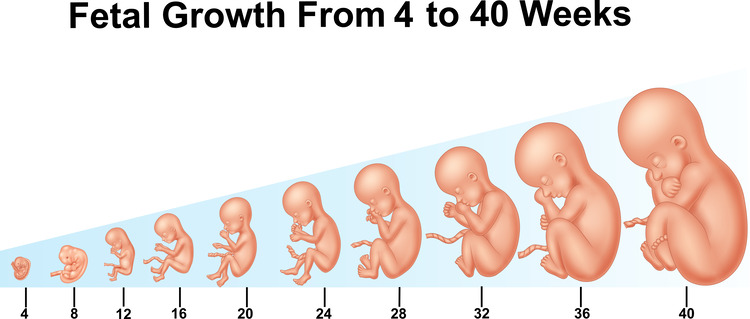
4th week of pregnancy - other symptoms
Hormonal changes can mean that the first symptoms of pregnancy do not take long to appear and can appear at the turn of the 4th-5th trimester. In some women, however, they may not appear in the early stages of pregnancy at all or are still very indistinct during this period. Alternatively, they will appear in later weeks. Early pregnancy symptoms that may or may not appear include:
- increased breast and nipple sensitivity (firmer breasts),
- slower digestion, bloating, flatulence,
- exhaustion
- more sensitive sense of smell,
- pain in the lower abdomen,
- nausea,
- increased appetite,
- mood swings (sensitivity).
In the 4th week of pregnancy, no belly will be visible yet. It can be inflated or inflated. Some women may notice a darkening of the areolas around the nipples on their breasts at the end of the 4th week. It is normal for a woman to feel increased fatigue during this phase. The body goes through many changes and consumes a lot of energy. We recommend that women increase their intake of vitamins (D, B, C, Omega-3 fatty acids, iron, calcium, magnesium), folic acid, avoid stress, alcohol or cigarettes and enjoy a high-quality and balanced diet.
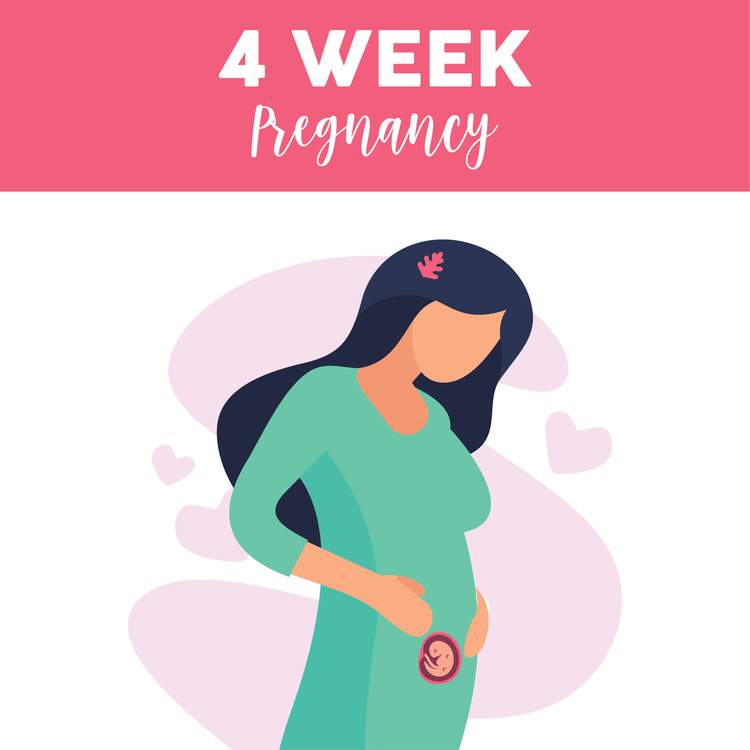
4th week of pregnancy - experiences
Most often, women in the 4th week of pregnancy in forums decide whether it is already possible to see the fetus. Several women agree that the gestational sac or fetus was not visible on ultrasound/sonography until the 5th-8th week of pregnancy. According to them, ultrasound is not yet important in this period (4th week). Women also discuss the topic of pregnancy tests - the result can be ambiguous, and several discussants said that they planned to see a gynecologist only after the pregnancy test showed a positive result twice in a row, while the test was carried out a week apart. In some cases, the women were dealing with possible ectopic pregnancy, as their hCG values were higher, but the fetus was not visible on the ultrasound.
The most frequent questions - FAQ
Did you notice any interesting observations in the 4th week of pregnancy? Did you already know during this period that you were pregnant? Did you take a pregnancy test in the 4th week of pregnancy? Share your experiences with other mothers or expectant mothers. Your advice and recommendations can be very helpful for many women. All you have to do is join the discussion under the article and contribute with your comment.
Can I go for an ultrasound/sono in the 4th week of pregnancy?
What is the value of the hCG hormone in the 4th week of pregnancy?
What is the belly like in the 4th week of pregnancy?
What is the size of the fetus in the 4th week of pregnancy?
Gallery
Pridať komentár

